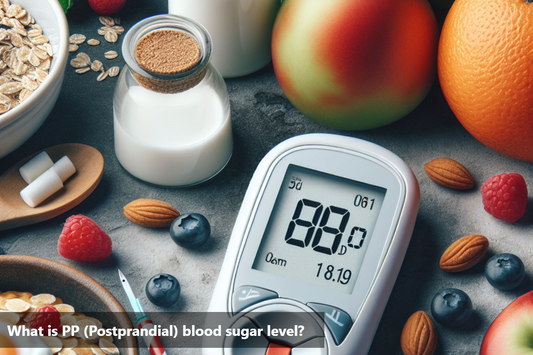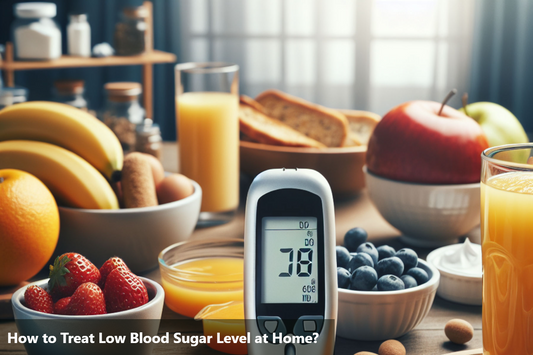Hemoglobin carries oxygen from the lungs to our body. Maintaining optimal levels is crucial for diabetic patients' health. Understanding this role in oxygen delivery is key for managing diabetes. Increasing hemoglobin can boost energy, reduce fatigue, and improve organ function. Adequate levels are important for overall health and are essential for various bodily functions, including oxygen circulation. This blog shares insights on the importance of hemoglobin for diabetic patients and tips to increase levels for better health.
Factors affecting hemoglobin levels in diabetic patients
Blood Sugar Control
-
Poorly managed diabetes can cause blood sugar levels to go up and down, which can impact hemoglobin levels. High blood sugar, called hyperglycemia, can make hemoglobin molecules change, leading to more glycated hemoglobin (HbA1c). It's important to monitor and control blood sugar levels well to keep hemoglobin levels in check for people with diabetes.
Anemia
-
Anemia is when someone has too few red blood cells or low hemoglobin levels, and it's common in people with diabetes. Anemia can happen due to different reasons like not getting enough nutrients (like iron, vitamin B12, or folate), kidney problems (which are common in diabetes), or other health issues. Treating the causes of anemia can help raise hemoglobin levels in those with diabetes.
Kidney Function
-
Chronic kidney disease (CKD) is a common problem in diabetes and can affect hemoglobin levels in various ways. CKD can reduce the production of a hormone called erythropoietin, which is important for making red blood cells, leading to anemia. It can also mess with how the kidneys control blood cell production and cause the buildup of toxins that harm red blood cells.
Nutritional Status
-
Eating poorly and not getting the right nutrients can lower hemoglobin levels in people with diabetes. Not having enough iron, vitamin B12, or folate can affect red blood cell creation and lead to anemia. People with diabetes should make sure to eat foods rich in iron (like meats, fish, beans), vitamin B12 (found in animal products), and folate (found in greens, fruits, beans) to help their body make hemoglobin.
Medications
-
Some common medications used to treat diabetes can impact hemoglobin levels. For instance, certain diabetes drugs (like metformin) might make it harder for the body to absorb vitamin B12 or increase the risk of anemia. Also, medicines used for other health issues, such as high blood pressure or heart problems, can also affect hemoglobin levels.
Chronic Inflammation
-
Diabetes is linked to ongoing low-level inflammation, which can change hemoglobin levels. Inflammatory substances in the body can affect how red blood cells are made, how iron is handled, and lead to a type of anemia caused by chronic inflammation. By making lifestyle changes like regular exercise, eating well, and reducing stress, people can manage inflammation and lessen its impact on hemoglobin levels.
Genetic Factors
-
Genes can play a role in hemoglobin levels and the risk of anemia in people with diabetes. Certain genetic variations affecting how hemoglobin is made, how the body handles iron, or how red blood cells are produced can raise the chance of anemia or change hemoglobin levels regardless of how well diabetes is managed.
Dietary changes to increase hemoglobin
Iron-Rich Foods
-
Choose iron-rich foods like lean meats, chicken, fish, and organ meats. You can also get iron from plants like beans, tofu, dark green veggies, seeds, and dried fruits.
Vitamin C-Rich Foods
-
To help your body absorb iron better, have foods high in vitamin C with iron-rich foods. Some good sources of vitamin C are oranges, strawberries, kiwi, tomatoes, bell peppers, broccoli, and colorful fruits and veggies.
Folate and Vitamin B12-Rich Foods
-
For folate, eat foods like dark green veggies, beans, fortified cereals, asparagus, avocado, and broccoli. Vitamin B12 is mainly in animal products, so if you're a vegetarian, you might need fortified foods or supplements.
Copper and Zinc-Rich Foods
-
For copper, include nuts, seeds, whole grains, seafood, and organ meats in your diet. Zinc can be found in meat, seafood, nuts, seeds, whole grains, and dairy products.
Lifestyle modifications and supplements
-
Regular physical activity and ways to relax are really important for people with diabetes to have healthier levels of a substance in their blood called hemoglobin. When you exercise, your body makes more red blood cells, which carry oxygen around your body. If you do calming activities like deep breathing, meditation, or mindfulness, you can reduce your stress levels and help your body make better hemoglobin. I try to spend time every day doing these things to stay healthy and balanced.
-
Along with changes to your lifestyle, taking supplements like iron and vitamin C can also be useful in managing hemoglobin levels in people with diabetes. Iron is really important for making hemoglobin, and vitamin C helps your body absorb it better. In general, a well-rounded plan that includes staying active, managing stress, and using the right supplements can really improve hemoglobin levels in people with diabetes. It's important to talk to your healthcare providers for personalized guidance on managing your hemoglobin levels and staying healthy.
Bottom Line
-
Recap the important information about monitoring hemoglobin levels for diabetes.
-
Emphasize the need to regularly check hemoglobin levels for diabetic patients.
-
Encourage readers to talk to their healthcare providers for personalized guidance.
People should talk to their healthcare providers to get personalized advice on raising hemoglobin levels safely and effectively. Healthcare professionals can give tailored advice based on individual health needs, leading to better outcomes and a better quality of life. Regular check-ups and talks with healthcare providers can help manage diabetes better and live a healthier life.
DiabeSmart is the first food range exclusively crafted for diabetics. Enjoy clinically tested, delicious products that let you keep your favorite food habits while managing your blood sugar levels effortlessly.
This Blog post is an initiative by DiabeSmart, to provide accurate and Nutritionist / Doctor approved information related to Diabetes. DiabeSmart is India's first Food brand designed specifically for Diabetics, that has been clinically tested on Diabetics and Pre-Diabetics to deliver 55% - 70% lower Sugar spikes. DiabeSmart is part of Lo! Foods - India's leading brand for Everyday Functional Health foods.















